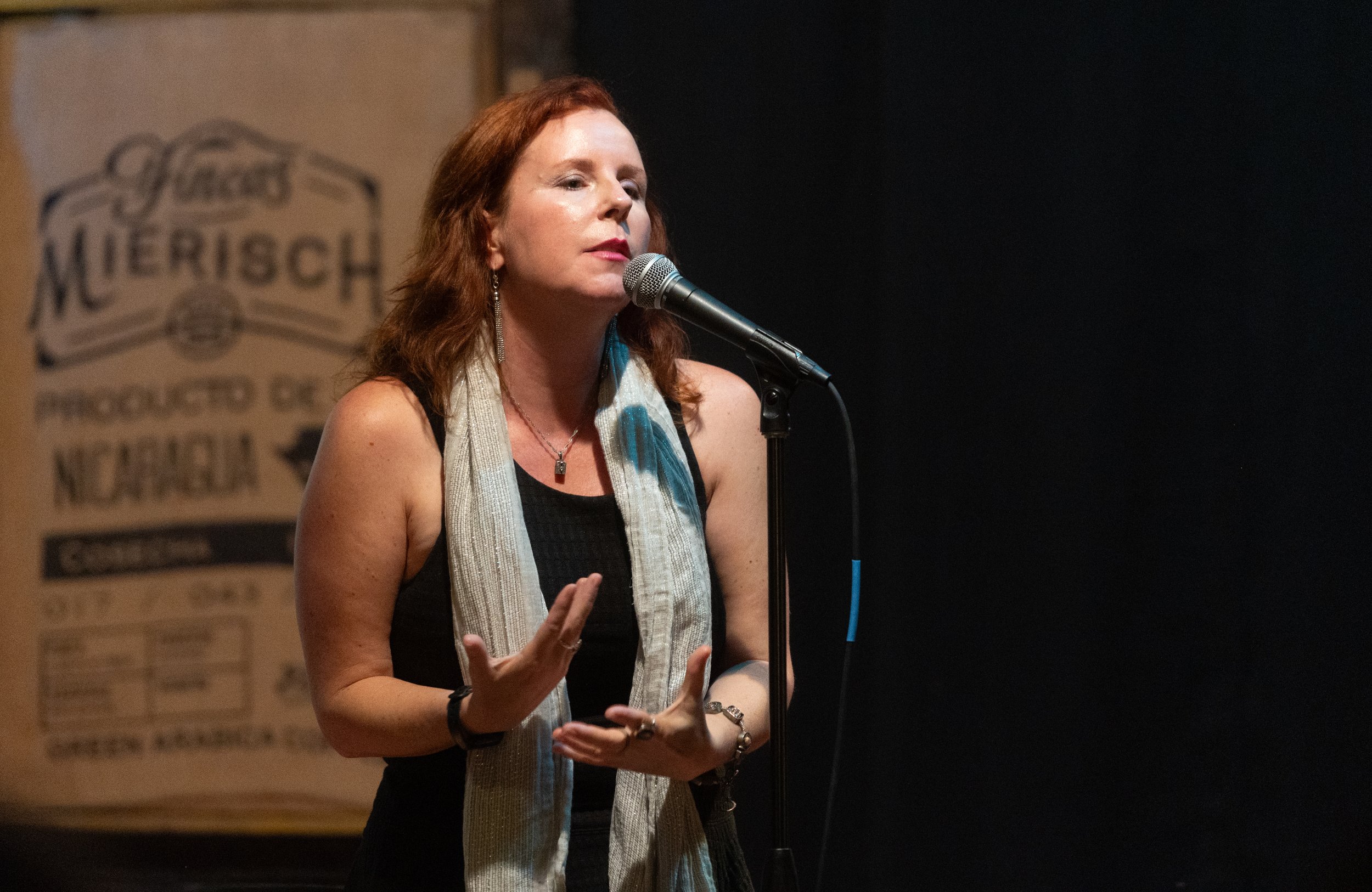Happy New Year! In this week’s episode, our storytellers ponder the big questions about life and death.
Part 1: When Shannon Turner’s high school friend passes away from a rare virus from a monkey, she contemplates her sense of purpose.
Shannon M. Turner is a professional storyteller and story coach, as well as a writer, dreamer, and nerd. She is the Founder/Creative Director of StoryMuse, which offers storytelling techniques as a tool for personal discernment, team building, and community development in effort to cultivate a world where all stories are heard and honored: StoryMuse.net. She is also the producer of Carapace, Atlanta's OG monthly true, personal storytelling event. To learn more about the foundation Beth's family founded to promote workplace safety in scientific research, please visit https://www.ergriffinprogram.org/about-us.
Part 2: After a traumatizing experience with a dead body leaves journalist Erica Buist agoraphobic, she embarks on a journey to understand how other cultures handle death in hopes of healing.
Erica Buist is a writer, journalist, lecturer and author of the book This Party’s Dead. Between writing plays, audio drama and short films for Stockroom Theatre Company and managing the social media for literary nonprofit Tupelo Press, she is slowly writing her first novel.
Episode Transcript
Part 1
Tonight, we've been talking about stories of faith. Some people put their faith in science and some people put their faith in religion. Some people put their faith in Beyoncé, that's why I'm wearing silver tonight because she said it was Virgo season and, therefore, we should wear silver.
Some people put their faith in astrology. I certainly felt a little bit unlocked when I learned what it meant to be a Gemini rising, which meant that I am a little bit two faced. It means that I live in the gray areas. It means that I see the good and the bad in everything.
We were part of the Methodist complex growing up. It was the family business. We moved around all the time. Every year, our contract was up. We could stay or go. It meant that we would say we want to stay or go. The church could say we want them to stay or go. But, ultimately, the church superstructure would say stay or go.
Like I said, I can see the good or the bad in everything, so the bad part of that is that I have a hard time trusting any situation. I have a hard time making solid relationships with people. But the good part of that is that I, as a Leo sun, got to reinvent myself everywhere I went.
Halfway through my junior year of high school, we found ourselves moving yet again, which was very hard because I was almost through high school and it was doubly hard because we actually moved back to a place where we had lived before. So how was I to reinvent myself?
Shannon Turner shares her story at Waller’s Coffee Shop in Atlanta, GA in September 2023. Photo by Allison Carter.
I was reconnecting with people and meeting new people, and there was Beth, one of the most ethereal creatures I'd ever known before. She was smart and she was so sweet and she was a dancer and she rode her bike.
Beth went to the church that we were now at. We had this Bible study that we got to go to, because I was at the big bougie church on Church Circle in Kingsport, Tennessee. So, I was so pleased to try to get to know Beth, but Beth was one of those people that I felt like I really couldn't connect with. I've spent my whole life trying to connect with these kinds of people and feeling like they were, well, I was in Tennessee and they were on Mars.
We were in one of those moments in Bible study where everyone was laying around. It was kind of that that intimacy that only teenage girls can achieve. I'm sorry if you've never been a teenage girl. You don't know what this feels like.
But we were laying around on our JanSport backpacks and Beth was asking me how I felt about the perm that I’d just gotten, because it was the ‘90s. And I was saying it was the worst mistake I'd ever made, because I was a teenage girl and lacked perspective.
I was like, “Oh, my God, it's the worst mistake I've ever made in my life. It takes four products to take care of.”
And she ran her hand through my hair as far as she could, because it was a perm, and she said, “Well, it looks beautiful and you are always beautiful and you're beautiful on the inside and the out.” It just zinged me to the core. It was the kind of thing that, because I am the kind of woman who tends to like men, I really wish that a guy would say to me.
I so appreciated Beth in that way, because I felt connected to her in a way that I'd never felt before.
We graduated from high school and we went on to college. Beth came here to Atlanta, to Agnes Scott, a women's college, which is where I really wanted to go but, because I was a part of the Methodist complex, I went to a small Methodist liberal arts school in southwest Virginia. We promptly lost touch with each other because it was before the days of Facebook or even email. We didn't get email until we were almost through college in the ‘90s.
One day, because even though there wasn't Facebook, there was still the Methodist mom mafia, I came home and my mom said, “I have something to tell you. Your friend, Beth, is quite sick.”
Shannon Turner shares her story at Waller’s Coffee Shop in Atlanta, GA in September 2023. Photo by Allison Carter.
This was shocking, because Beth was so hale. She was so sporty. She and her mom and her sister were the kind of women who, when we would go on our Methodist mission trips, would come into the locker rooms when we were all hot and sweaty and would just strip off all of their clothes and walk straight into the showers, which is what you tend to do when you take a shower. But I was so full of shame I would try to still stay clothed going into the shower, because I thought, as a Christian woman, that's what you were supposed to do, was to be full of shame and all to be in your body.
Beth had, at that point, ridden her bike across Europe and danced in Japan. I couldn’t imagine how Beth could possibly be sick in such a way that my mom would take note of it.
After we had graduated from college, she had gotten an internship here at the Yerkes Primate Research Institute. She'd already co authored papers that had words like ‘nipple preferences’ and ‘sexual primate rhesus macaque’. I don't know. I mean, these are like, I wish that I had them written down on the back of my hand, but she was amazing. Dancer, scientist, athlete.
One day, when she was transferring a monkey cage from one place to another, some monkey fecal matter had flipped up into her eye and it had created a very rare instance of herpes B virus transfer from animal to human. Monkeys pass this to each other all the time, but when it happens from animal to human, it creates a very drastic situation. When it's caught quite early, it can be mostly intervened, but it's only happened in about 50 cases in the 20th and 21st century.
So we all waited and watched over the course of about three weeks while paralysis slowly crept up her body, all the way to her eyes. It, for a moment, started to subside, so we thought that she would beat it. But then, ultimately, she succumbed.
This was a national tragedy. If you were watching, if you were here in Atlanta, this was on Dateline. It created quite a scandal. Beth's family actually created a foundation because she should have been wearing goggles when it happened. So, they created a foundation to really support workplace safety and scientific research.
A photo of Beth courtesy of Elizabeth R. Griffin Research Foundation.
Meanwhile, I mentioned that I had gone to a liberal arts college and I had gotten an English degree and a Women's Studies minor. I had fallen headlong into a wandering journey, because I didn't want to go to grad school or become a teacher. There were no options for me. I was actually just careening into one identity after another as my early life had sort of imprinted on me. I was rebelling against or trying to embrace identities.
I had worked in a bar. I had substitute taught, got fired from substitute teaching. I had lived at a camp. I had cleaned for some really nasty undergraduate boys.
About six months after Beth passed away, one night, I was cleaning a toilet in a bar that some sorority girl had thrown up in when some toilet water flipped into my eye. All of a sudden, I had one of those moments. We've talked a bit about those this evening.
Now, I talked about all of the things that we can keep our faith in. One of the things I have faith in is pop culture and my annual film schedule. The NeverEnding Story is one of those.
There's this moment in The NeverEnding Story where the whole world has been destroyed and two children are standing in front of each other. There's a small little light crystal in their hands and the world is about to be reborn again. That is what an epiphany feels like to me. My whole world was distilled down to that moment in a tiny little light crystal and it felt like it was about to be reborn.
When Beth died, she was living her purpose. Like I said, she had already ridden her bike across Europe and danced in Japan and published all these papers. What if I had contracted some bizarre disease from scrubbing a toilet in a bar? And there is nothing wrong with cleaning as a profession. I've continued to do it to support myself as an artist. But I was frittering my life away with no sense of purpose. And who was I to do that?
So, my life was reborn.
Shannon Turner shares her story at Waller’s Coffee Shop in Atlanta, GA in September 2023. Photo by Allison Carter.
Six months after that, I was in AmeriCorps, which led to a career in the non profit industrial complex, which led to grad school, which led to me becoming a storyteller and a story coach, helping people tell their stories and hear each other across lines of difference.
Now, that sounds like a success story in the same way that a life like Beth's seems kind of perfect, in a way. We have a tendency to tell stories in a way that have an arc, like a life itself feels like a scientific experiment, right? We have a hypothesis. We go out and gather evidence. We come back and examine it.
A life that is very short feels perfect because we'll never know if Beth had a chance to question her research. If she would have gotten married and divorced. A life that is very long feels like a slog, like an experiment that doesn't work over and over and over again. But, now, I have to get over my long term feeling that I would die early. I'm faced with the knowledge that I might actually live a long life on the finances of being an artist. And I can tell you that, at the very least, I have ridden my bike across Ireland, tried to walk without shame through a Korean spa, naked, and gone swing dancing through Atlanta. In the very least, I am so grateful for the friends who light the way.
Thanks y 'all.
Part 2
I'm snooping in a dead man's fridge. It's not an official postmortem, but he's still upstairs in his bed and I need an answer now. I stare at the contents, trying to find the culprit for a stopped heart.
I knew he was dead an hour before my partner Dion found him. It was all there in the text. “The cleaner’s at Dad's and he's not answering the door or phone. Milk and paper haven't been collected and the dog is barking. He's probably just asleep or out, right?”
Suspicion that something's wrong. Confirmation that something's wrong. Denial that anything's wrong. It was practically a death certificate.
We lived with Chris for two years before we found our own place. He once whispered to me conspiratorially that he'd had a lie in until 6:00 AM. Anytime I got up after 8:00 AM, he'd be like, “Half the day's gone!” Of course, he wasn't asleep.
Erica Buist shares her story at Aces and Eights Saloon Bar in London, UK in May 2023. Photo by Richard Mukuze.
It's been less than three hours since Dion found him. He arrived this morning at 9:30 AM, opened the door and called, “Dad.” He went to the kitchen and saw the mess and the dog's ribs. He fed him twice, already knowing what he'd find upstairs.
He opened the bedroom door and saw his dad in bed with a book on his chest and glasses on his head. He must have nodded off while reading, but that was eight days ago. Now, we're downstairs and Dion will not let me see him, but in a moment of trauma he describes it.
“Bloated and green. Flies. Zombie dad,” he says.
Which makes it all the more awkward when the handle comes off the bedroom door and the wind blows the door shut and the undertakers are trapped in there with him. Also awkward, Victorian houses have no soundproofing whatsoever. So, when the police come downstairs to say that nothing looks suspicious but, also, would we mind awfully if they broke down the door to release the undertakers from their prison and the world's grossest cellmate. They can definitely hear us laughing. And, wherever you are, we are still so sorry.
They break down the door. The smell fills the air. How can I describe it?
The scientific words are putrescene and cadaverine. It smells like meat and fruit left for days in the sun. I remember the moment it lodges itself in the muscle of my brain, so much so that years later when I visit a ham shop in Spain and I walk through the corridors, strung with thousands of those great naked pig legs, the smell is so familiar that I almost faint.
One day, I walked past a house in Pimlico and know with absolute certainty that someone is dead in the basement, and I wonder what to do.
I should say, it's not the worst smell in itself but it dissolves the seams of your sanity because it's death, the one thing we're taught to look away from. It smells like staring at the sun.
Months later, I'm home on my laptop. I'm a contracted features writer for The Guardian and I look like I'm working fervently on a story. In reality, I'm on Facebook, stalking everyone I know, because how have I never noticed that anyone I'm not currently looking at might be dead. I guess it falls to me to check on everyone. It falls to me to message them and look for the double blue tick that is evidence that they've read the message. And when they respond with a gesture of normal conversation, I go quiet, because I'm already checking on the next person, because I'm no longer a friend. I'm a head counter. A satellite botherer.
I'm also, if this is even an important detail, an agoraphobe. What does that even mean? Why is everyone so big on going outside every day? Like who is outside’s PR team? It's not even that good. You know when you go outside and the air goes all thick in your lungs, it's like breathing melted chocolate. Am I right? Guys? Guys, am I right?
Erica Buist shares her story at Aces and Eights Saloon Bar in London, UK in May 2023. Photo by Richard Mukuze.
No, I'm not. Of course, I'm not right. I'm just an agoraphobe now, which does not mean that you're afraid of open spaces. It just means that you have a panic attack when you go into one.
Here's the thing. You need a little bit of faith to go outside, and I don't have any. So, you're all here tonight despite the risk that you could be hit by a car, stabbed, swallowed by a sinkhole. That's the kind of faith that I just simply don't have anymore.
So, I decided to Google how to get over agoraphobia. I'm sort of hoping that it will be like, yeah, you just need like some orange juice and an hour of Netflix. It doesn't say that. It says I have to go outside. How rude is that? Like, genuinely so rude. That's like, “Oh, you have a migraine? Go to a nightclub and stare at the pretty lights.” It's like, find a honking tuba and just make out with it.
So, I get over how rude that is and, eventually, I think, “Okay, here's what I'm gonna do. I'm gonna go out and I'm gonna buy a sandwich.” Right? That is it. Should be fine.
It's not fine. The panic just overwhelms me and it finally takes me down in the supermarket. I don't even buy the sandwich. I just throw it and I run home. Then I'm back at my kitchen table where the air is thin and breathable. And I start thinking about Mexico.
I used to live in Mexico. I lived there the two years after uni. So, I saw a lot of Day of the Dead celebrations. Out of interest, I Google - I'm always Googling - death festivals around the world. It turns out there's loads of them. That sort of leaves me with a question, which is, how come people all around the world are looking at death and throwing a party and I've just thrown a sandwich?
My total inability to answer that question is what makes the next few years of my life so utterly bizarre, because I decide that I have to not only beat agoraphobia, but I have to visit death festivals, seven of them, one for every day we didn't find him. So, that's what I do.
First, I go back to Mexico to revisit Day of the Dead, which this is the one you've probably all heard of. So, you probably know that people sit up by the gravesites for two days and they throw a huge celebration for their dead relatives’ return. That's where I realize that when you have a death festival, you get to take care of the dead again. Until that moment, your love just sits there with nothing to do and it hurts.
Then I go to Nepal where they have a festival called Gai Jatra. Essentially here, everyone who has lost someone that year parades through a street with a procession with music and dancing and chanting and comedy. That's where I learn that grief's biggest lie is that you are alone. It's impossible to believe that when you're staring out at thousands of people who've been through the same thing.
Then I go to Sicily where, on Day of the Dead, kids wake up to like a treasure hunt of gifts that's been left not by Santa but by their dead relatives. That's where I learn that when you come from a culture that has death as a taboo, your dead loved ones get the stink of taboo all over them and the air goes all weird when you mention their name.
And then I go to Thailand where people burn paper versions of money as a way to get them— it is basically a gift that they're sending to heaven. Lately, it's been paper iPhones, paper mansions, paper clawfoot baths.
That's where I realized that you never get to buy the dead a gift again, unless you just do it anyway. Why not just do it anyway?
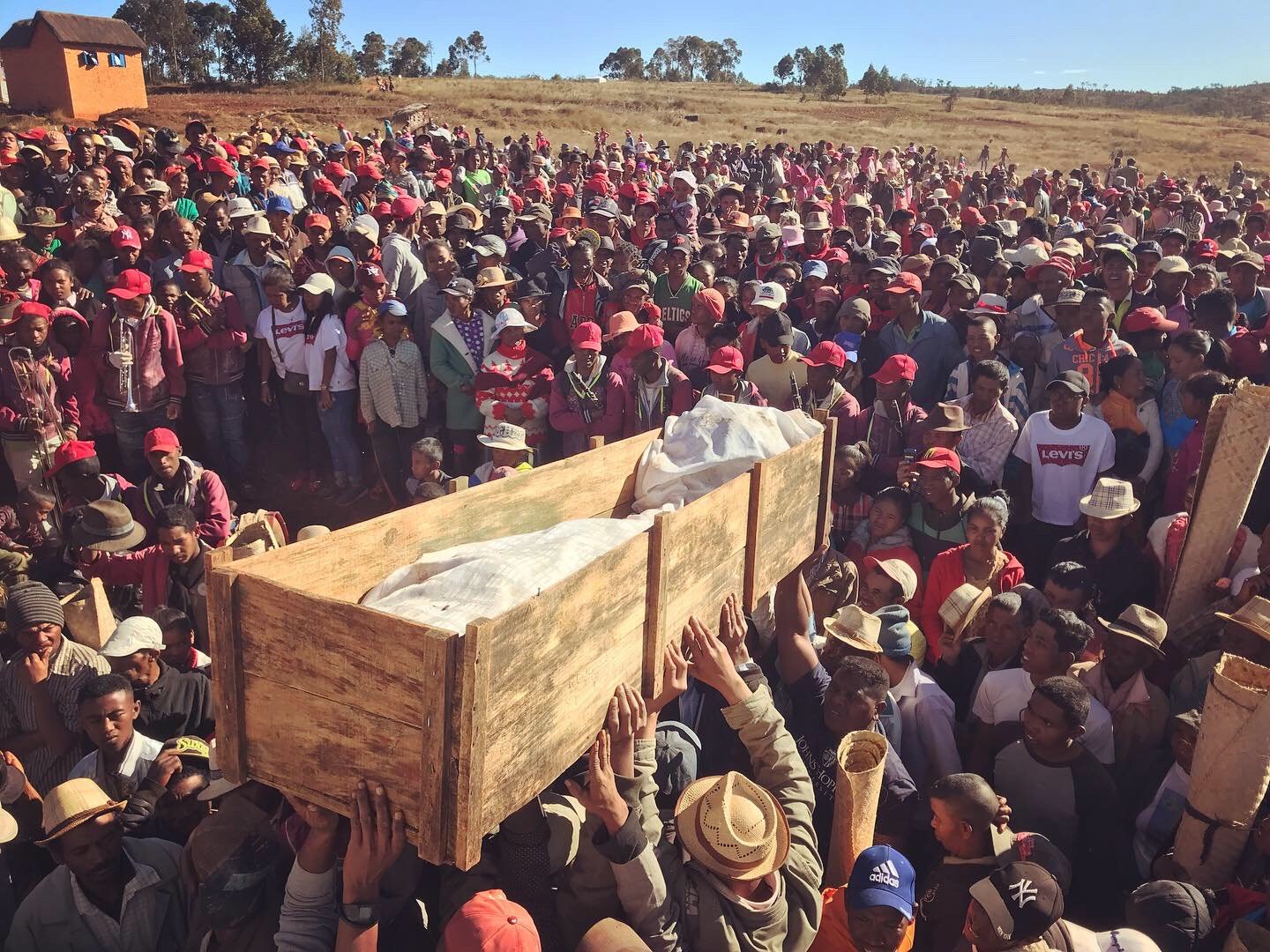
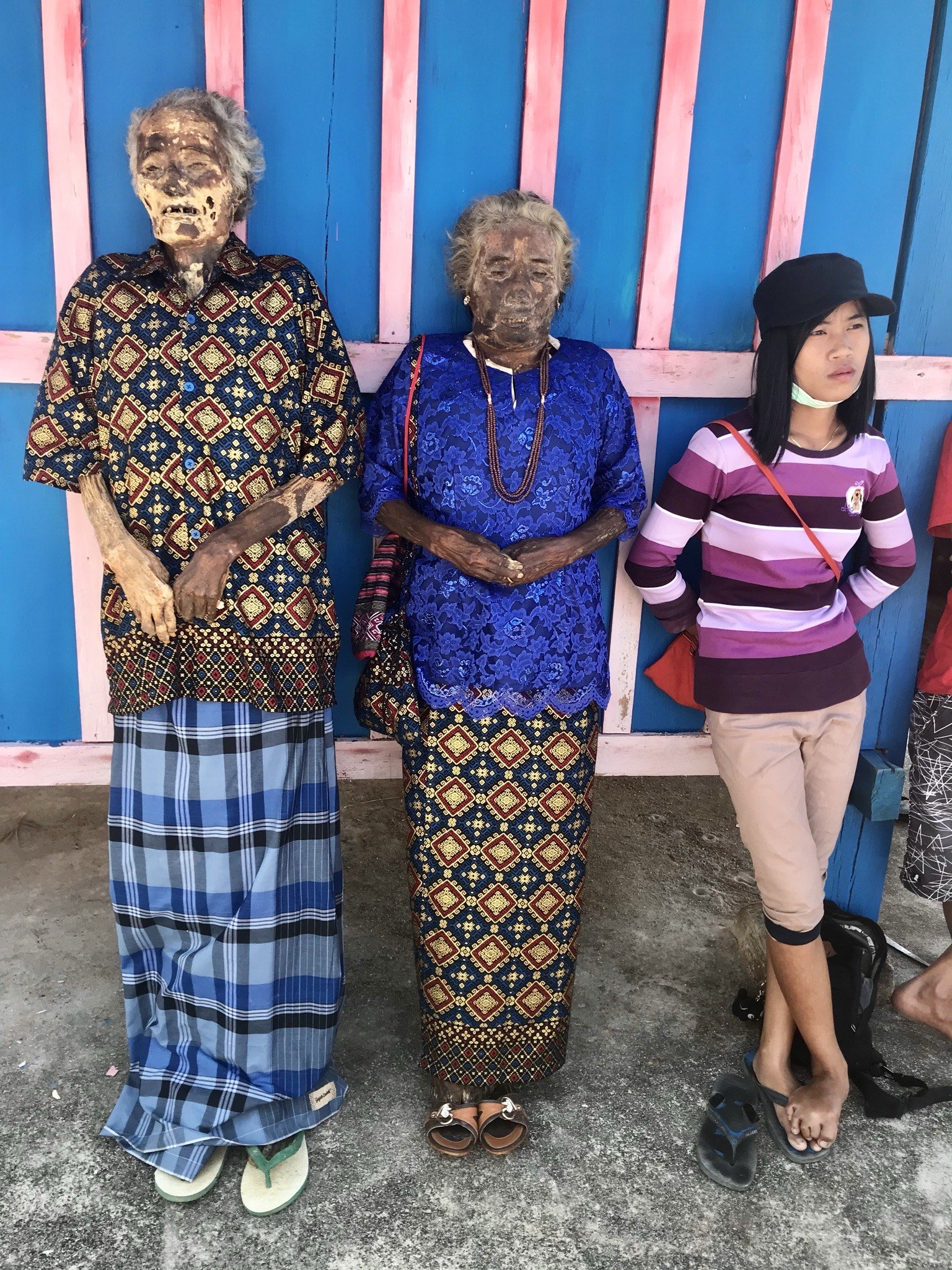
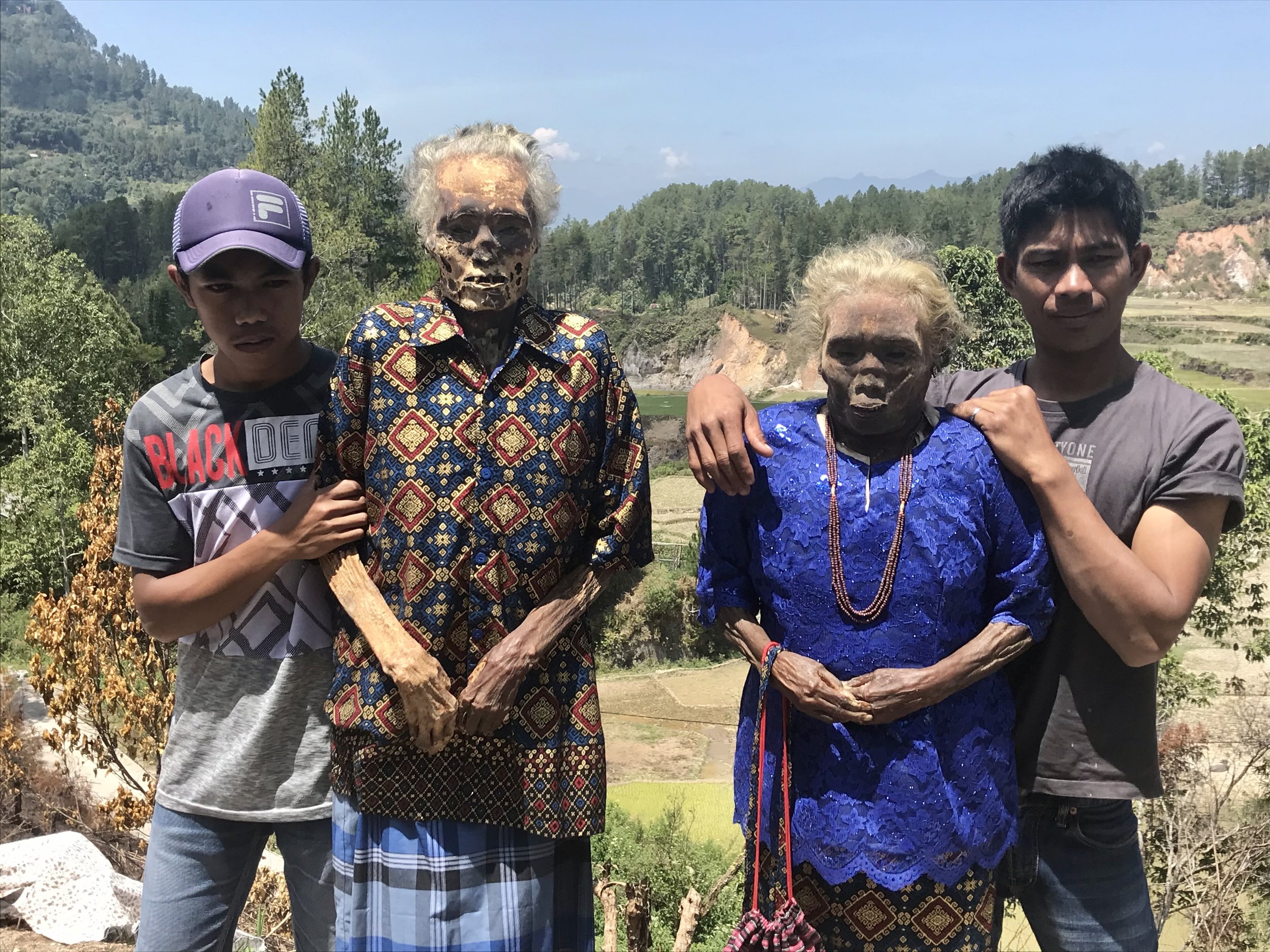
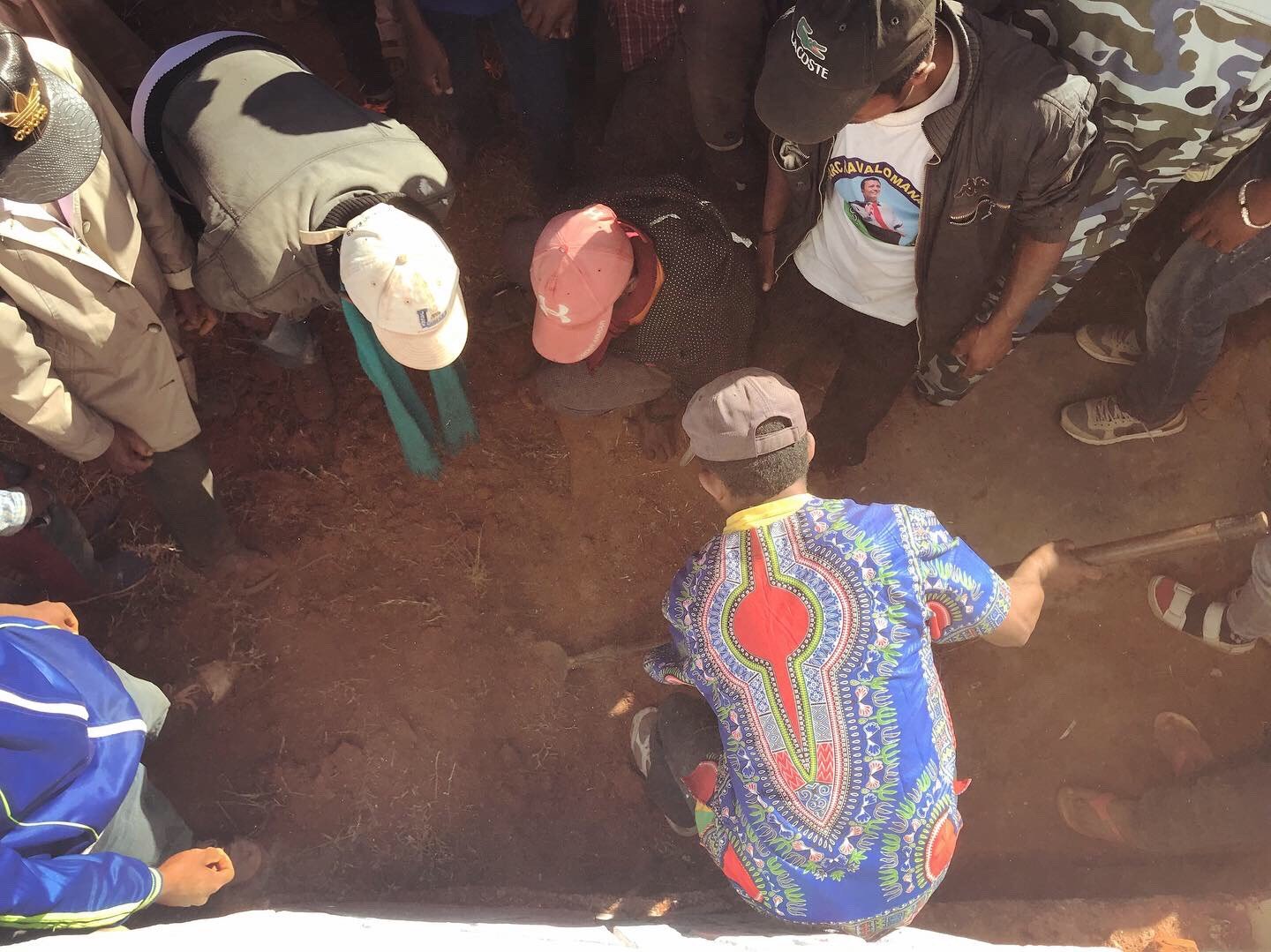
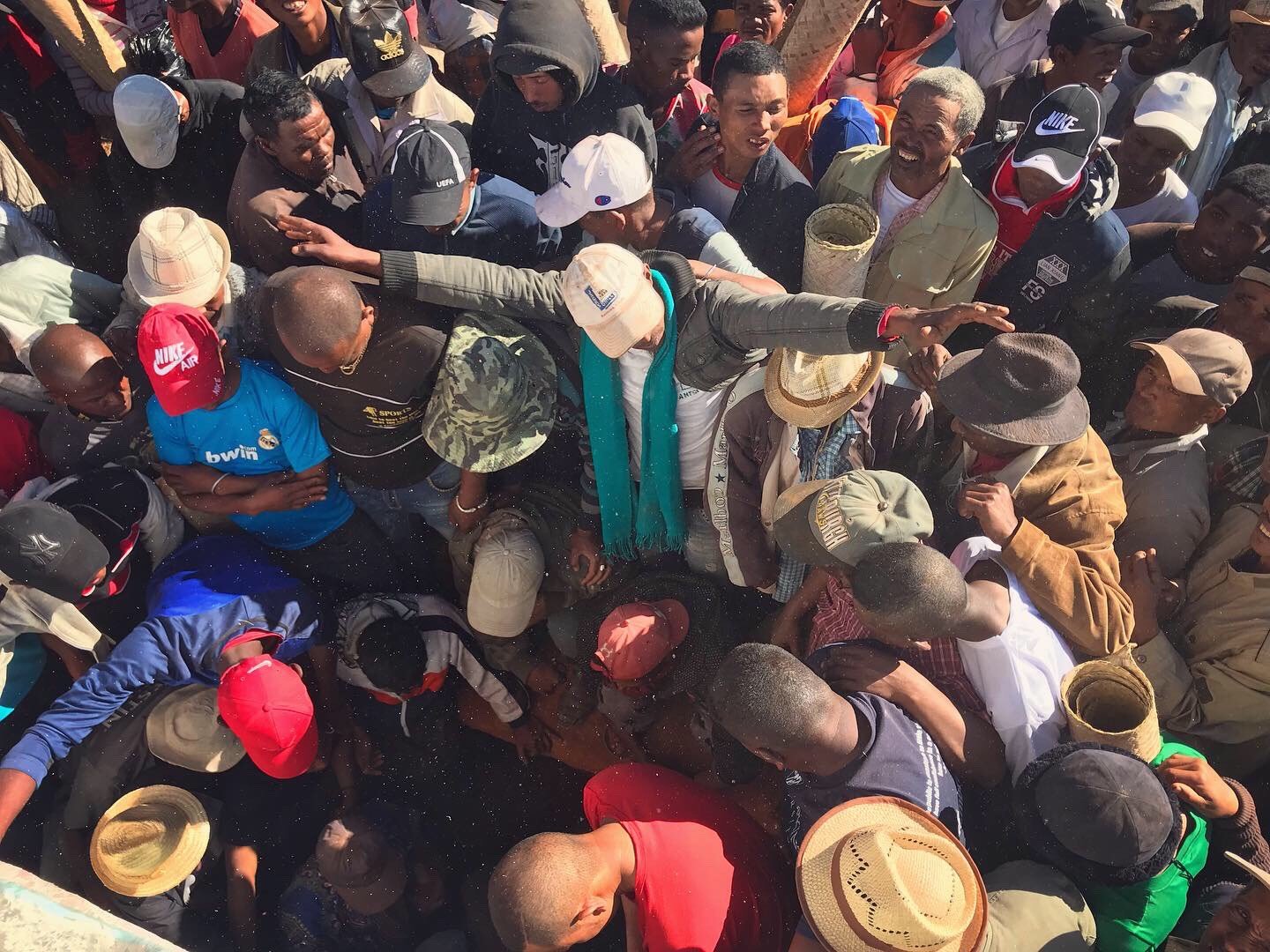
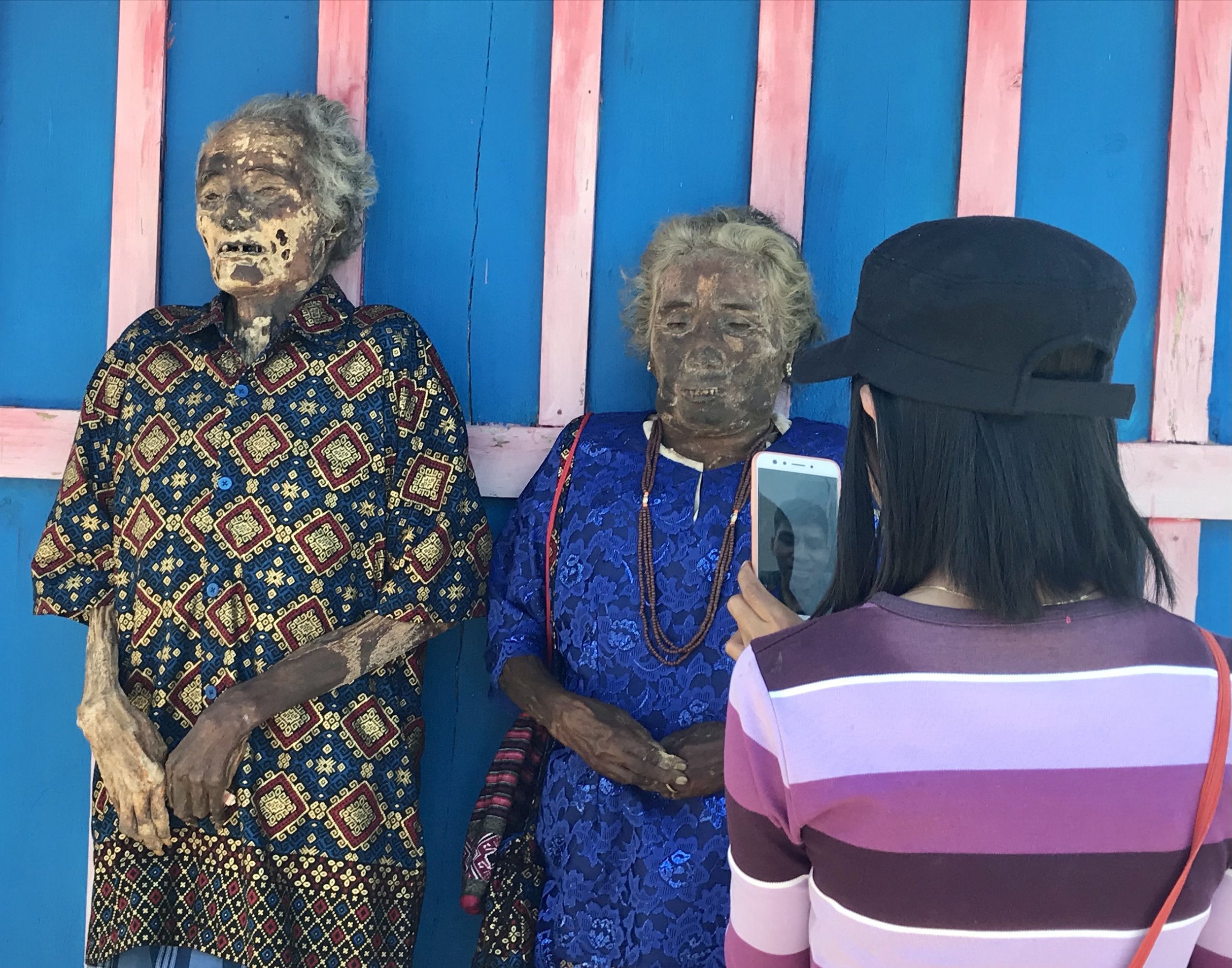
Then I go to Japan. And, much like Mexico, the spirits come back to visit and they're there for a whole week. Then they have a goodbye ritual at the end.
Kyoto is surrounded by mountains on which there are these enormous bonfires in the shape of Chinese characters, the idea being that the spirits kind of hitch a ride back to heaven on the bonfire smoke.
That's where I realized that grief doesn't heal like a cut. It's not a little better every day. So, there is nothing wrong with you if you burst into tears a year or five years later. And it is actually healthy to say goodbye again, and again, and again.
Then I go to Madagascar. And that is where an eight day old corpse becomes amateur hour, because at the ‘turning of the bones’, they actually take the bodies out of the tombs and wrap them in a fresh shroud and then dance around and have a massive party with them.
So, I'm standing on a concrete tomb. I'm being jostled from all sides by drunk, dancing men. There's a crowd of thousands of people and the air is full of music from a brass band and shouting and singing and dust. The dust is billowing from down below us where men are digging into the ground and pulling back a concrete slab. Then they start to take bodies out.
And they're passing them up to their descendants, shouting out the names on the sides that have been written there years ago.
Then my guide says, he hears a name and he says, “That's Lala's grandfather. Let's go.”
So, we go to the rickety wooden ladder and we climb down and we're jogging through the crowd with like, “Follow that car,” kind of energy. It takes us a few minutes to find the right corpse, which is not a sentence I ever expected to say. And the family are there, rewrapping them with fresh shroud, fresh tears. They asked to borrow my pen so they can write his name, so they can recognize him in seven years.
Then, all around me, corpses start rising up onto the shoulders of their descendants and everyone starts to dance and whoop and cheer. Then I feel a thonk. It's like a thonk at the back of my head. It's a freshly wrapped corpse, so I guess the balance was off?
I turn around and they're like, "Oops, sorry !"
I'm like, “It's fine. It happens.”
And I was standing there thinking I started this whole journey by having a breakdown because of my terror of death and the corpse. Now, I've just been hit in the head by one and it's funny.
Madagascar is where I realized that our culture has decided that when you die, you lose all your power. That is not the case everywhere. If you want to pray for health and wealth in the highlands of Madagascar, you're not praying to God, you're praying to your ancestors so they can put in a good word for you. So, you'd better keep them sweet.
And, just like that, the corpse starts to shed the disgust that we assume is natural and it becomes someone who gets invited to the party.
I did not take on this journey to heal myself. The book I wrote, This Party's Dead, I wasn't going to eat, pray, love with corpses. I wasn't trying to be like, "The real death festival is the friends we made along the way!" That's not what I was going for. I mean, no, but also yeah, like getting hit in the head by a corpse changed me. Are you sick of people telling you that? It did. It just made me realize that that kind of disgust we have around the corpse, it is cultural. It's not a lesson that you have to carry and it's not one I'm going to carry anymore.
Erica Buist shares her story at Aces and Eights Saloon Bar in London, UK in May 2023. Photo by Richard Mukuze.
The last festival I went to was in Tana Toraja in Indonesia, where they take the corpses out of the crypt and dress them in new clothes. People run up to them and shove phones in their dry, embalmed faces for photos and selfies and FaceTime calls from family members who couldn't make it. I can see the little screen. I can see someone going, “Oh, my God. Hi, Grandma!”
By this point, I've been on this journey for years and I think I'm past the idea that a corpse is a frightening thing. But then I see one more thing that changes me. It's a girl and she sat next to her grandmother who has been dead for four years. They just sort of sat in companionable silence, looking out at the mountainous view. Then she notices a little bit of dust in her grandmother's hair and she just brushes it away, just such a sweet, casual, loving gesture to a corpse.
I realize like, “Oh, I forgot about the love.” If grief is love with nowhere to go, then why not just give it somewhere to go? That's why some people throw a party and I throw a sandwich. People who throw a death festival just giving the love somewhere to go.
So, yeah, a couple of years ago I got hit in the head by a corpse and it woke me up.
Thank you.
